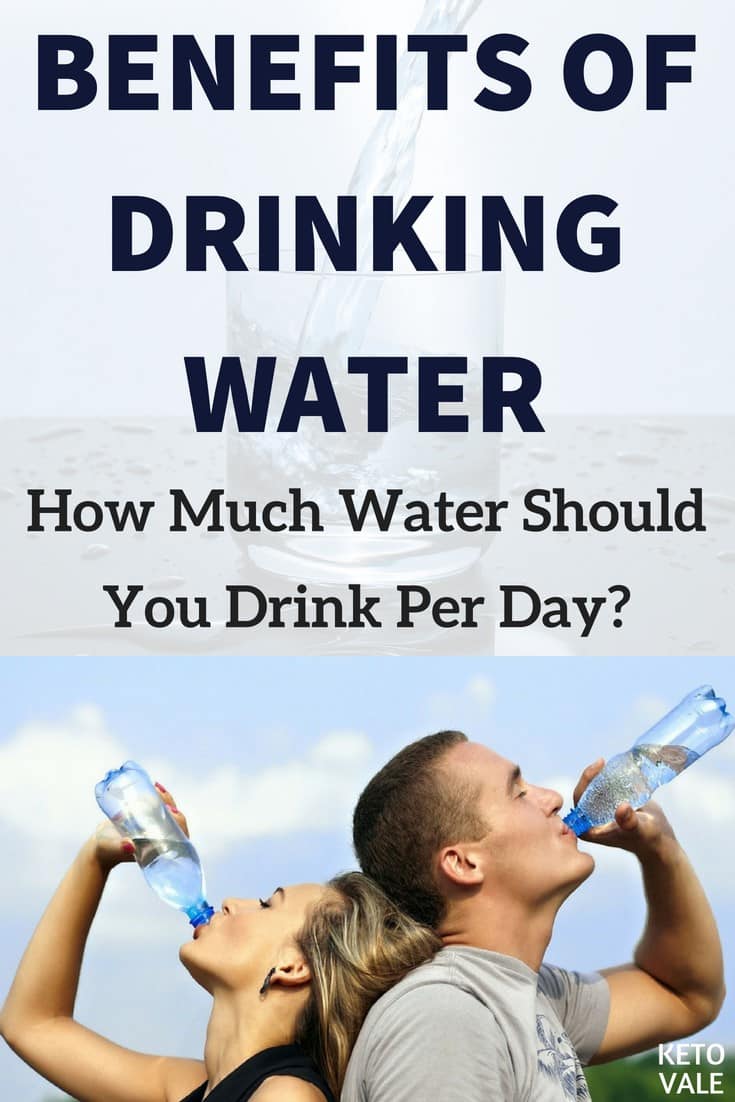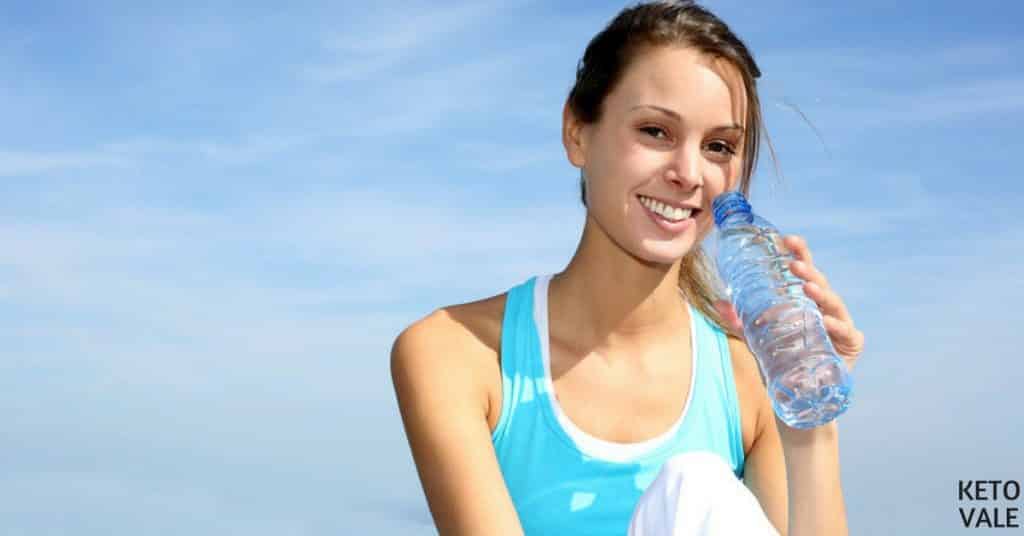Many people overlook the importance of drinking enough water each day. We become so focused on what’s in our food and how many calories we’re eating per day that we forget to consume enough of the one thing that our bodies need most of.
Water makes up more than half of our body weight, and we are constantly losing water through sweat and urine (1).
Drinking enough water can help keep your skin healthy, boost your metabolism, and ensure that your digestive system is working properly.
But how much should you drink? The answer might not be as standard as you think.
Furthermore, being on the keto diet might affect your hydration needs.
If you’re following a low-carb ketogenic diet and wondering how much water you should drink on keto, this guide is for you.
Main Health Benefits of Drinking Enough Water
#1. Improves Energy Levels, Performance and Brain Function
It’s no secret that if you don’t drink enough water, you can’t function at your best. Research shows that even mild dehydration can affect your mental and physical performance.
One study found that women who lost 1.36 percent of their fluid after exercising had impaired concentration and mood. Their dehydrated state also increased the number of headaches they experienced (2).
Another study found that heat exposure and exercise-induced dehydration caused cognitive dysfunction, such as fatigue, impaired short-term and long-term memory, and perceptive discrimination (3).
Being dehydrated also affects your physical performance by causing you to feel tired and altering your endurance.
One study found that dehydration resulted in a decrease in MAX VO2 and decreased work performance in test subjects (4).
Keep in mind that losing only one percent of your fluid content is enough to make you feel symptoms of dehydration. This occurs when you sweat a lot and don’t replenish with fluids, which is easy to do on a hot day or while exercising.
#2. Water Helps You Lose Weight
Many studies have indicated that drinking water can help you lose weight. There are a few reasons for this.
Water Boosts Your Metabolism
First, water intake can temporarily boost your metabolism so that you burn more calories.
One study found that subjects who drank 500 ml of water temporarily boosted their metabolism by as much as 30%. Researchers from the study estimated that drinking two liters of water each day can help you increase your energy expenditure by 96 calories (5).
It also helps to make sure your water is cold so that your metabolism works harder to bring the water to body temperature. This won’t burn a ton of calories, but every little bit helps!
Drinking Water Before Meals Helps Weight Loss
Additionally, you can drink water before meals to help reduce the number of calories you ingest.
One study found that older obese adults who drank water about 30 minutes before breakfast took in about 13 percent fewer calories than those who did not drink water beforehand (6).
Drinking water before meals also helps you feel fuller and keeps you satisfied for longer so that you don’t need to eat as much.
According to one study, people who drank 500 ml of water before a meal lost 44 percent more weight over a period of 12 weeks than those who did not (7).
Finally, water intake significantly improves your digestive process.
This might not seem like a big deal, but consider that your digestive system is where nutrients get absorbed into your bloodstream. Your digestive system is also your internal waste remover. The more efficient this process gets, the better your body gets at utilizing calories.
Other Health Benefits of Drinking Water
In addition to improving your digestive system function, boosting your metabolism, and enhancing your mental and physical performances, drinking water can benefit other areas of your health, too.
For example, research shows that increasing your water intake can help relieve constipation (8).
This is because the longer fecal matter sits in your digestive tract, the more water your intestines draw out from it. Drinking water allows waste to move through your digestive tract easier to help remove toxins in this area. For best results, you may want to drink carbonated water.
Drinking water may also be able to reduce your risk of certain cancers, such as bladder and colorectal.
One study found that a high fluid intake was associated with a reduced risk of bladder cancer in men (9).
Another study found that drinking water (and eating lots of fiber) helped reduce the risk of colorectal cancer (10).
Drinking water may also decrease your risk of kidney stones, according to some studies (11, 12, 13).
Finally, drinking water helps flush toxins out of the body, which can improve the appearance of your skin. Some research indicates that water can help keep the skin hydrated and improve acne, but other reports claim there is no proven association.
Still, you might notice that dry, cracked skin is a common symptom of dehydration, so it’s best to drink up if you’re worried about the appearance of your skin. You might notice that you also feel better in general when you drink up.
How Much Is Best?
Now that we know how good drinking water is for us, it’s time to address the age-old question: how much water do we need to drink? How much is enough and how much is too much?
The truth to this answer is that it varies from person to person. There isn’t an exact water calculator that you can follow. Many health experts recommend drinking eight 8-ounce glasses of water each day, but there is no real validation for this claim (14).
If anything, the 8 x 8 rule is an easy one to remember, and that’s why it’s recommended so often.
According to the United States National Library of Medicine, the average adult needs to drink between 91 and 125 fluid ounces (2.7 to 3.7 liters) of water each day (15).
Other health experts believe you need much more water than this and that you should sip on water even when you’re not thirsty.
The truth is that your water intake depends on your individual needs. There are many different internal and external factors that determine your individual water needs.
For example, if you are active or exercise regularly, then you need more water than someone who isn’t active.
Likewise, if you are going to be exposed to hot temperatures, then you need more water that day.
Your body does a good job of telling you when it needs water, and it’s important not to ignore these cues. This doesn’t mean that you have to chug water all day but aim for a comfortable amount that doesn’t cause an upset stomach or an electrolyte imbalance.
Pay attention to how your skin feels and how well your digestive system is functioning.
If your bowel movements are regular and look healthy, then you’re probably doing a good job of staying hydrated.
If it’s a strain to go to the bathroom daily or your skin looks dry and dull, then you might need to increase your intake. You may also need more water if you are breastfeeding or taking medications.
Water Intake on Keto Diet
If you follow the ketogenic diet, then you may notice that your water needs are different from that of the average glucose-burner. There are a few reasons for this.
First, your fiber intake has probably significantly reduced unless you intentionally eat low carb fiber rich foods or take fiber supplements.
Within the first few days on keto, you’ll also lose a good amount of water weight. Because of this, your digestion may suffer. You might need to drink a little bit more than the amount you normally would.
Drinking the proper amount of water can help prevent you from becoming constipated during the absence of fiber.
The keto diet is also naturally diuretic, which means you need to replace the water you’ve lost. This is because glycogen is bound to water molecules in your liver, and you will first burn through this before switching over to fat.
So as you become fat adapted and start losing weight, you may notice that you’re thirsty more often and much of your weight loss is from water.
Drinking water has also been shown to help eliminate symptoms of the keto flu during transition periods.
But while drinking enough water is essential, keep in mind that too much is not always better. This is because your electrolyte balance is delicate on the ketogenic diet.
Water Consumption and Electrolyte Balance
Drinking excessive amounts of water can cause an electrolyte imbalance, which causes you to feel tired, weak and dizzy. You may need to do some adjusting with sodium and electrolyte supplements to find the proper fluid balance for you.
You might even wish to add salt to your water in order to make sure you’re not becoming deficient in electrolytes. That’s particularly important if you’ll be sweating a lot. For example, during a heavy workout or a sports event – or even if you’ll be spending a lot of time outside in hot weather.
Sodium supplementation is the most important variable when you’re trying to find the right amount of water you need daily, and also where the key to your electrolyte balance lies.
Magnesium and potassium are rather constant for most people.
Potassium should come from food, and you need 4700 mg of it daily, while magnesium can be supplemented at around 200 to 400 mg daily.
In general, if you’re experiencing any signs of an electrolyte deficiency, such as headaches, muscle spasms, muscle weakness or general fatigue, and especially if they’re sudden, your first course of action should be to have some salt. AIm for 0.5 to 1 g or so, more if you have been sweating a lot in the past few hours or if your symptoms subside but do not go away completely.
Keep in mind that your food also contains water, and sometimes lots of it. For soups and smoothies, that’s rather obvious, because they’re liquid, but actually almost all foods contain some amount of water.
For example, let’s take a hundred grams of 10% fat ground beef. On average, it’ll contain 10 grams of fat and 20 grams of protein. Have you ever wondered what are the other 70 grams made of? Yes, that’s right, they’re mostly water!
So, if you’re eating lots of foods that have a high water content, such as raw or steamed vegetables, you’re already getting some water from them.
Also, consider your caffeine intake. If you’re a coffee lover and drink more than two cups a day, then you’ll want to adjust your intake accordingly.
A good rule of thumb is to drink when you’re thirsty and don’t overdo it. You may also want to limit your caffeine intake to make sure you’re not dehydrating yourself.
Bottom line: how much water you need to drink daily is an individual thing and it depends on many factors as mentioned above. Simply drink when you’re thirsty. If you’re exposed to high heat or if you workout or exercise intensively, or if you’re on keto diet during the first week, make sure to drink enough water to compensate for the water loss.
Enjoy this post? Save to Pinterest for later reference!








